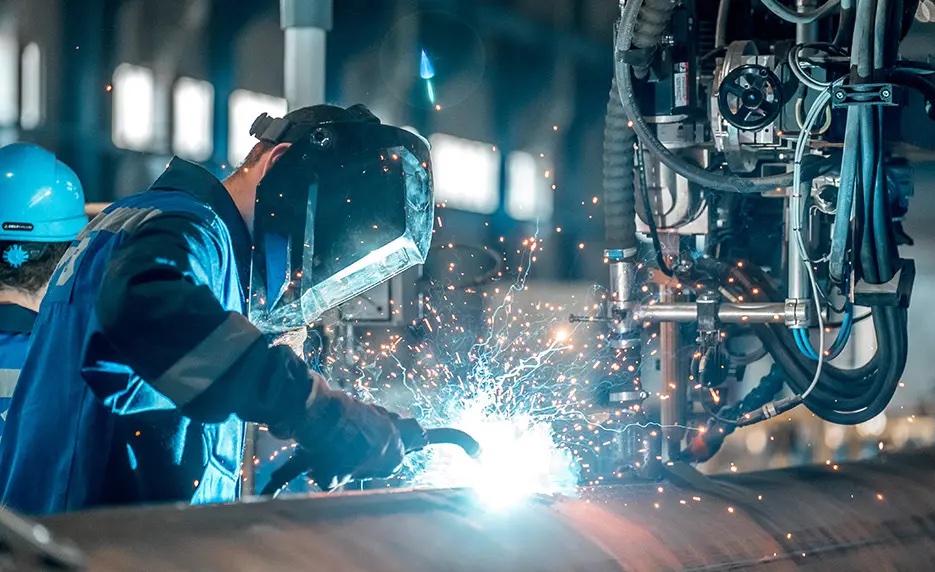Should You Become a Welder Technician?
December 8, 2021 | Ed2Go

If you enjoy working with your hands to build or repair certain things, welding may be the perfect career field for you. With the country’s aging infrastructure, there’s a huge demand for the expertise of welder technicians to help reconstruct highways, bridges, and buildings.
As welding involves using flames and complex tools, you will need sufficient training and practice to become successful in this occupation. Once you earn the relevant credentials and experience, you can continue developing your skills to ultimately progress in your career and accomplish larger projects.
Below is a guide to what a welder technician does, skills and qualifications needed, job outlook, and industries that hire welders.
What Does a Welder Technician Do?
Welder technicians use remotely controlled or hand-held equipment to join, repair, or cut metal parts and items. For example, they may use arc-welding equipment to bond metals together to form component parts.
Typical job responsibilities of a welder technician include:
- Welding different metal pieces together in flat, vertical, or overhead positions
- Cutting metal components down to size
- Examining workpieces for defects and inspecting for specifications
- Performing processes for finishing metal parts
- Studying engineering drawings, sketches, blueprints, and material safety information
- Igniting welding torches and striking arcs
- Calculating dimensions of metal parts to be soldered
- Filling holes or hammering out bends and bulges
- Laying out, arranging, aligning, and securing metal parts
- Choosing welding techniques and necessary equipment
- Cleaning welded metal off surplus weld, spatter, or slag
- Mixing and applying protective coatings
- Maintaining tools and machinery
What Skills Do You Need to Become a Welder Technician?
To start your career as a welder technician, you typically require postsecondary coursework, technical training that focuses on welding skills, or relevant work experience that involves using several welding methods such as tungsten inert gas (TIG) and metal inert gas (MIG).
Prior welding experience is often optional to get started as businesses hiring welder technicians usually provide on-the-job training to teach applicants safety practices, their job duties, and specific welding methods the business uses.
As the job may involve standing for extended periods or lifting heavy objects, you need physical strength and stamina. Other qualifications include attention to detail, time management skills, and the desire to learn. You will have to work alongside other crafters, which necessitates exceptional communication skills and the capability to work as a team.
You may also need spatial orientation skills as welder technicians have to read, understand, and interpret 2D and 3D diagrams to fit metal products appropriately.
Occupational Outlook for Welder Technicians
Let’s take a look at some quick facts about welder technicians as mentioned on the U.S. Bureau of Labor Statistics (BLS) website:
- In 2020, the average annual welder technician salary was $44,190 ($21.25 per hour).
- The typical level of education that most people need to become a welder technician is a high school diploma or equivalent.
- You don’t usually need any work experience in a related occupation.
- This occupation involves moderate-term on-the-job training.
- In 2020, around 418,200 jobs were announced for welder technicians.
- This career field is expected to have a growth rate of 8% from 2020 to 2030, which is as fast as the average growth rate for all occupations.
- On average, about 49,200 openings for welders are expected annually.
What Industries Hire Welder Technicians?
If you’re interested in becoming a welder technician, you may be wondering where welders work. According to the BLS website, the majority of welder technicians work in the manufacturing industry (64%). They work both indoors and outdoors, often in inclement weather. The nature of work depends on the exact industry or welding project. More precisely, welder technicians typically work in the following industries:
- Shipbuilding
- Industrial Maintenance and Repair
- Construction
- Natural Gas Distribution
- Automobile Manufacturing and Repair
- Railroad Manufacturing
- Aerospace Applications
- Pulp, Paper, and Paperboard Mills
- Electrical Power Generation, Transmission, and Distribution
- Pipeline Transportation
Even though some state and local governments have licensing or certification requirements, welding is usually considered a very mobile career. Exceptional welder technicians are known as elite trades practitioners who can find work almost anywhere.
How Many Hours Do Welder Technicians Work?
Most welder technicians work full-time. You’ll also find them working overtime, particularly on time-sensitive projects such as certain construction jobs. In that case, welder technicians may have more than 40 hours of weekly workload. As several manufacturing plants operate around the clock, they often have two or three 8- to 12-hour daily shifts. This means that some welder technicians also work weekends and evenings.
Want to learn more about starting a career as a welder technician? Explore our online Welder Technician course.
Sources:






